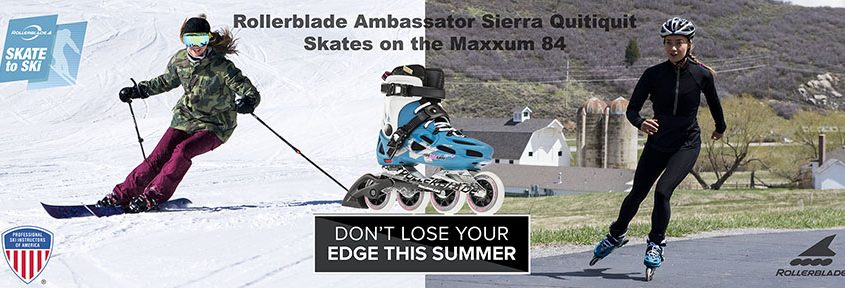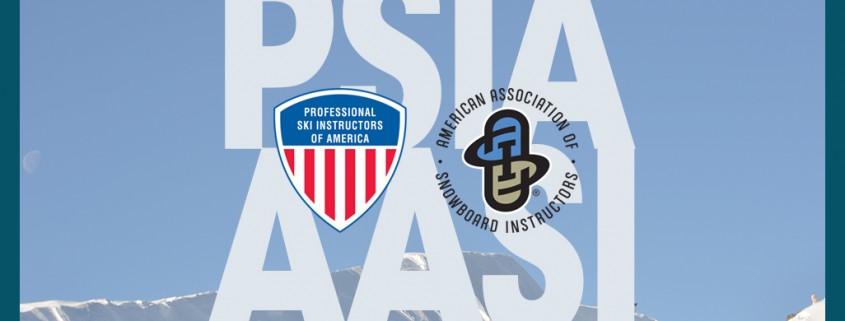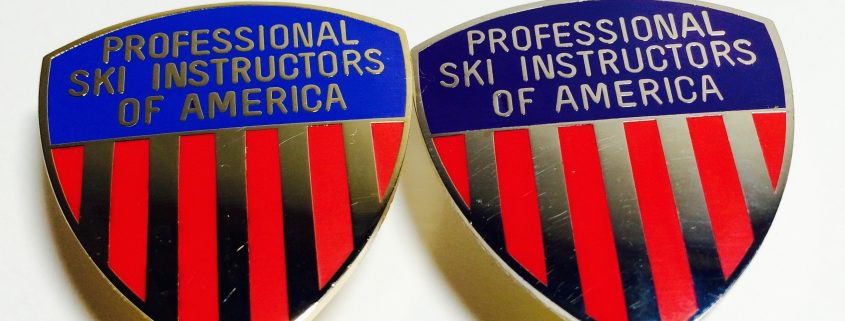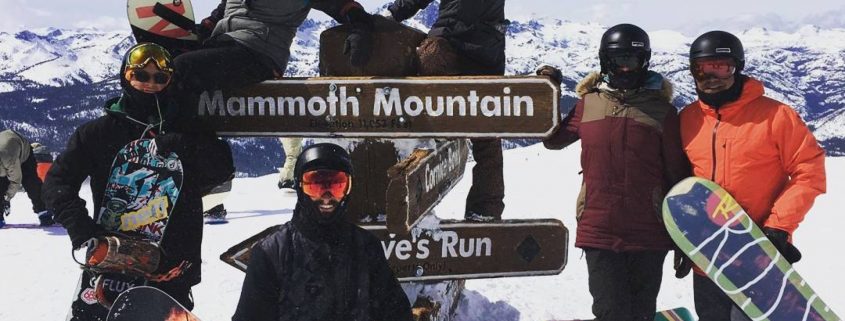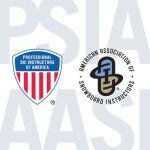Inline Update: Skate to Ski Camps, Freestyle Fun + Pro Offers
/in News /by Kristi JOther than catching a plane to Australia or Chile this summer, inline skating is one of the best ways to work on your skiing skills while you wait for the snow to return.
With inline skates on dry land you can successfully mimic on-snow movement. The dynamic balance, body posture, weight shifting, and rhythm needed to control skis in the snow (moving downhill, changing direction) are strikingly similar to those needed to navigate inline skate wheels.
The fact that you can do it with other professional ski and snowboard instructors also means you can talk technique while you’re working the wheels. To that end, PSIA Alpine Team member Heidi Ettlinger said the PSIA-AASI Western Division is planning to build on last year’s successful PSIA-W Skate to Ski Camp with two camps – one in Southern California and another in the Tahoe region – this year.
Ettlinger said the fun, educational, interactive events are so rewarding that, “I’m encouraging other divisions to consider these clinics in their home regions by forwarding out the event summary we circulated last year.”
Last year’s camp was made possible by PSIA-AASI Official Supplier Rollerblade, and Myles Cotter-Sparrow, the brand’s marketing coordinator, said he is committed to helping professional instructors launch similar events of their own.
“Our goal is to have PSIA-AASI examiners and skaters be the point people in their region for these kinds of events, but we need to start building that right now,” he said. “Whether it’s making sure a demo fleet is available for participants, helping people know which size skates they need, or even identifying a good location for an event, I’m happy to be a resource for anyone who wants to take advantage of this opportunity this summer and fall.”
Cotter-Sparrow also added that while inline skating has proven to build the skills and fitness of traditional alpine skiers, the sport is seeing significant buy-in from the freestyle market as well.
If you want more information on how to build a Skate to Ski event in your region, please e-mail Myles at myles.rollerblade@gmail.com
A recent article on NewSchoolers.com with several embedded videos, takes a closer look at how Olympic freestyle athletes are gaining a competitive edge by cross training on inline skates.
You can also check out more videos on the Rollerblade homepage right here, and shop for your own personal pair of Rollerblade inline skates – all at member-specific pricing – on the Pro Offers page.
-Peter Kray
You Can Still Play On The Snow!
/in News /by Kristi JIt May feel like Summer….but some of our Member Schools are still feeling the winter vibe. Don’t put those skis away yet, below is a list of our Member School Resorts that are still open.
Squaw Valley Spring
Open daily thru June 4, operating hours: 9am-4pm
Open Saturdays & Sundays thru June 25, operating hours are to be determined based on conditions
Open July 1-4, operating hours are to be determined based on conditions
Open Saturdays starting July 8 into summer as conditions allow
Alpine Meadows is closed for the season
Mt Rose
OPEN Thursday – Sunday plus Memorial Day, May
May 29 is Closing Day
Mammoth Mountain
Open Daily
Mammoth will remain open for skiing and riding until July 4th and beyond.
Daily Lifts: 7:30AM–3:00PM
Don’t forget about the back country too;-)
Thanks for a great season!
/in News /by Kristi JThe Western Division PSIA-AASI want to thank all of you for another amazing season. We all had a fullfilling season putting up with all the shoveling, crazy driving, endless powder days and everything else that comes with an epic winter.
Message from our president
“Our Western membership numbers were record setting this past winter! Thank you to all of our long standing and newest members and our snowsports schools, “The 2017 California snowpack is close to the largest on the record,” according to a NASA news release. The snowfall, combined with your energy has made the 2016-17 a wonderful year!”

California’s Current Snowpack Is Larger Than the Previous 4 Years Combined, NASA Says
The Matrix
/in News /by Kristi JIf you scroll down to the very bottom of our home page , you may come across something new…
, you may come across something new…
The Matrix.
Now you might be curious about what the Matrix is. In one sentence, It is a database of educational videos on everything from specific moves to varying terrain in all disciplines.
This is what the makers say: “The Matrix is your one-stop shop for all ski and snowboard educational video content. You’ll find related videos, plus supporting drills and content, that helps you maximize your learning time. The content constantly changes and brings to life skiing and riding from all sliding genres, including adaptive, cross country, and telemark too.
Years ago we built an app using Adobe Air technology and since that time there have been substantial improvements in web and mobile based technologies that have allowed us to create a web-based, responsive website that pulls in videos from our Youtube channel and allows us to categorize and tag these in a user friendly manner.
It also allows us to continuously add more video content on the fly and there is no need to install an app on your mobile device or desktop computer, making access to The Matrix that much easier.”
If you go in, you will have to login using your national ID you use on thesnowpros.org. Once you’re in, you’re free to explore. They have content on Movement analysis, teaching, dealing with varying conditions, and more. This is perfect for if you have that one thing you need to study for your exam that you just don’t understand when you read it from a book. If you’re new to PSIA, it will also give you a bit more understanding about what we do. Creating a thesnowpros.org account is free.
So go ahead, click on it. I Guarantee you won’t be asked to take a blue or red pill, nor will you be able to dodge bullets.
New Events coming April 3-15
/in Alpine, News, Snowboard /by Kristi JIf you still want to get your level 1 or your Snowboard Level 2 this season, we have some new events coming up!
You can go see them all and register at https://psia-w.org/new/calendar/
April 3 – Snowboard Level 1 Validation at Boreal
April 3-5 – Alpine level 1 exam at Mount Shasta Snow Park
April 4-5 – Snowboard Level 2 teach exam at Heavenly
April 9 – Snowboard and Alpine level 1 Validations at Bear Valley
April 9 – Snowboard Level 1 Validation at Mount Rose
April 15 – Alpine Level 1 Validation at Mount Rose
Be a Kid Again – go to camp!
/in Featured, Freestyle, News, Snowboard /by Kristi JLets face it – kids these days have so many options when it comes to snowboarding camps. From Woodward camps to High Cascade to developmental
groms teams, there is definitely no shortage of opportunities for kids to go to a camp and get quality coaching on the hill and fun times at camp. Don’t you wish you had the opportunity as a kid – or even better, now as an adult who can appreciate the experience?
Cue Snowboard camp 2017.
AASI West and Mammoth Mountain are hosting one of the premier snowboarding events of the 2016/2017 season. Connect with like-minded, driven riders from around the country on Mammoth’s legendary freeride and freesytle terrain for a three day, camp style experience. Up your game in the park, push your freeriding to new levels, and shred with your fellow riders!

Coach Lea Logal flies over a jump

Seth Johns

Lea Logal
AASI-W Education Staff,
Snowboard Coach Northstar Teams Program
Snowboard Level 3 Certified, Alpine Level 1 Certified
USASA 200 Coach
Children’s Specialist
Master’s Degree in Criminal Justice
 Chris Hargrave
Chris Hargrave
President, Windell’s Academy, Mt. Bachelor, OR
AASI National Team member
Ramp Up Your Park Game
/in Alpine, Freestyle, News, Snowboard /by Kristi J

Alex Baker at the Northstar Freestyle session in March 2017
Did you Know PSIA-AASI West holds Freestyle Session Events? This is a 3 day focused freestyle training, you will have the opportunity to ride one of the best parks in North America with some of our best PSIA-AASI freestyle staff.

One of Mammoth’s parks. Photo by Mammoth Mounatin

Chris Ball Winds up for a 360
What is a Freestyle session?
A Freestyle Session is an education event and an exam all at once. While less structured than regular exams, attendees still have the opportunity to prove they meet the standards for PSIA-AASI Freestyle level 1, 2, or 3. It’s like an exam, but more “freestyle”, so to speak. When you sign up, you do not sign up for one specific level, but you attend and are given the level you deserve at the end. This way, if you do not have a level 1 but are riding and teaching in the park at an advanced level, you may receive your level 2 or even 3. Likewise, if you are going with a level 2 as your end goal but do not meet all the standards, you can still walk away with a level 1.
Who can attend?
If you have at least your Alpine or Snowboard level 1 and are a current member, you can attend. These events are for skiers and snowboarders of all park abilities. You are split into groups based on ability after the first day, so you will be able to ride with people who will push you within limits. So if you are working on your 720s and hit 50 footers with ease, no need to worry about being stuck in the first-timers park. If it is your first time in the park, don’t worry about having to hit the biggest features or being left behind. There’s something for everyone.

Brian Norman, showing that the halfpipe is for skiers too
What can I expect each day going into a freestyle session?

Ronnie hitting a jump with style at Northstar
All three days are technically part of the exam, but each day builds up to the final day when you will receive the results of what level you achieved. Not only will you work on teaching in the park, but you will have the opportunity to work on your own ability and pushing your own limits. The first day is more freeform, and you can expect to receive coaching on your own riding. Expect to explore all the parks and see what the resort has to offer and become comfortable with the parks there. Day 2 focuses a little more on coaching, and you can expect to receive and give a few pointers with your fellow attendees. Although you will still have some coaching from the PSIA-AASI tech team, day 3 is almost all coaching from your peers. You will be observed not only on your riding, but your ability to teach the group a certain skill in the park. What you teach depends on the level you are going for.

Doug Fagel, one of the trainers, boosting out of the pipe
Photos and writing by Hanalei Edbrooke
The Last Lesson
/in Alpine, News, Seniors /by Kristi JBy Crook Rusty
My wife and I were having dinner one night when the phone rang. It was an old friend from my past. This man was not a bosom buddy, but he had been a friend for years. We had worked in the same ski school for years, and in the last years he had worked for me in my senior program. He informed me that he had moved back to town, after his wife passed away and now was living with his daughter in Carson City.
He told me he was 94 years old and that he had not skied for 10 years, and had never used the new shaped skis. He had been an avid golfer and had lived for quite a while in Palm Springs, California. Now that he was back in town he wondered if he could still ski and he wanted to try the new shaped skis. In the old days, he was a certified instructor and was more than adequate as a skier and instructor.
avid golfer and had lived for quite a while in Palm Springs, California. Now that he was back in town he wondered if he could still ski and he wanted to try the new shaped skis. In the old days, he was a certified instructor and was more than adequate as a skier and instructor.
I informed him that a couple years ago I had a stroke that left me with double vision, so he was asking the walking wounded for help. I asked him why he wanted me, of all people, to help him. He said that he trusted me because he knew that I was so politically incorrect that he could believe what I said and there would be no B.S. I told him if he was willing to put up with me, I would certainly try to help him as best I could. I offered to pick him up, but he informed me that he was still driving and would meet me at the ski area.
We met in the cafeteria, had a cup of coffee, and mapped out our plans for the day. I told him that being an accomplished skier was actually a detriment because he was so used to the old-school methods. I asked him to forget all the things he used to teach and do. I told him what we would do is work on some basic skills, focus on function, and have fun.
It is my belief that older people still have good thought processes and can have their mind do the work their body no longer is able to fight through. It was good to be with an old friend to try and make the most out of function while having fun at the same time. It is my belief that if you don’t understand what you’re trying to do and can’t really feel it, there is little hope of accomplishing anything.
I was able to get my buddy a pair of high-performance shaped skis, good boots, and a pair of ski poles. We were now ready to take on the mountain.
We started with a review of what the stance should be. He agreed with most everything that I said except he thought the weight should be on the balls of the feet, but he told me that being flat-footed made a lot more sense.
The first little drill that we tried was a straight run to a gliding wedge. Here we used flexion and extension. It is a known fact that many older skiers are quite stiff in their body movement. I think by finding out what body movement does for you, he could see how movement helps you with what you are trying to get the skis to do. We took at least two runs doing our change-up drill. By doing this, he could actually feel how the up unwaiting of the extension made it easier to operate the skis. I think that feeling this is very important.
We were working on relatively flat green runs. We were having a good time and no one was bothering us. We were on a long run that gave us plenty of time to work on different maneuvers. The next thing we worked on was keeping a good body stance. After we worked a little on the stance, we worked on the ability to flatten one ski. In doing this, we obviously made a long radius turn in the direction of the flattened ski.
We did this at the top of the rise and it became quite easy to feel what was going on with the skis. In the wedge, people have their weight on the two inside edges. When one of the inside edges is flattened, the other ski becomes dominant, and makes a skier turn.
It was at this stage of our drill that we started talking about a strong inside body. As we flattened the inside ski, we raised our inside hand, elbow, and shoulder to help our body cross over and change the side of the ski that was flattened. This is a simple drill, but it seems to be the biggest help to keep from stepping off the new inside ski to the outside ski. This stepping movement is old school and is referred to as the up and over move. Instead of stepping, we are looking for a flow towards the new turn. I think a lot of the really good skiers still use stepping as they have for many years. It seems to me, this simple drill can help them be more current and flow towards the next turn.
In the natural progression, we take this wedge turn into a wedge Christie. As long as we keep doing the same things we did in the first drill, we maintain good body mechanics and flow. We like to call this the silky-wedge Christy and it seems to be a very important thing. If you get it right, it can help you in most of your general skiing.
Our next drill was obviously the wide track parallel turn and by using almost the same maneuvers, we found it very easy to make a few changes. It is still important to flatten the inside ski and to keep involved all the other things that we were doing. As we go on to the more advanced turns, it all seems to fall into place. By the time we were through, my old friend and I looked around and determined we were more than likely the most contemporary and functionally sound skiers on the hill. Of course, we could have been a little prejudiced.
My friend called me the next day and told me that after the two and a half hours of skiing his legs were not tired at all. I think that was a good testimonial of how well contemporary skiing helps seniors. After 60 years of teaching skiing, it was more than likely my last lesson, and was a great way to end my career. This lesson put me on a high that lasted for weeks.
Interested in finding out more about teaching seniors? Check out our senior summit event on March 5-6!
CONTACT US
Serving California, Nevada, and Hawaii
Mailing Address:
P.O. Box 969
Truckee, CA 96160
Member Services
(303) 987-9390
memberservices@thesnowpros.org


